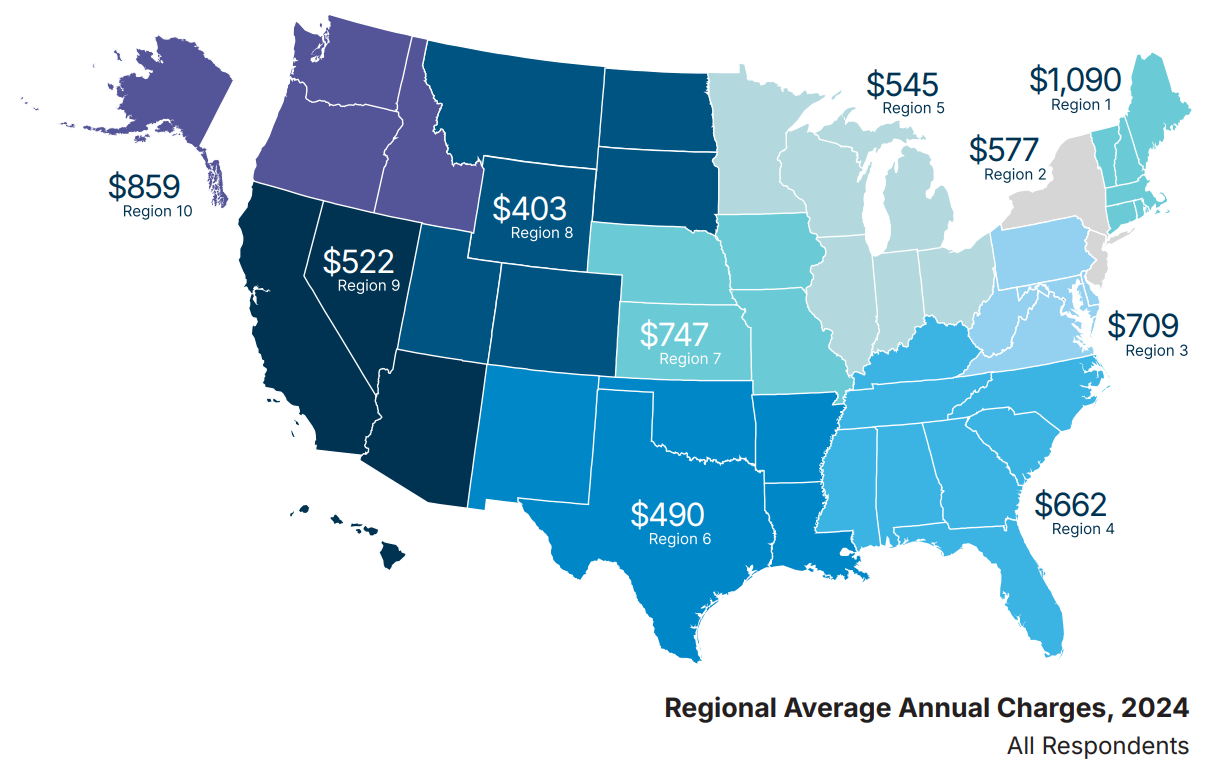Calculating rates for wastewater services
Service charges are the primary source of revenue for the District. Charges are paid to our wastewater utility by our municipal customer communities, as the District does not bill households or businesses directly for wastewater services. Residential and commercial customers with questions regarding their water bill should contact their municipality directly using the contact information on their bill.
What are service charges?
A service charge is a fee collected to pay for services related to the product/service being purchased. At the District, service charges are a primary source of revenue.
Instead of billing residential and commercial customers directly, the District charges the 24 municipal customer communities in our service area (e.g. Middleton, Fitchburg, Monona, etc.) directly. The District’s customer communities then set their own sewer charges, which are billed to individual residences and businesses. These charges cover each community’s share of District service charges, as well as the community’s own sewer maintenance and infrastructure costs.
Service charges are the primary source of revenue for the District. These charges fund the District’s expenses, such as building new sewer infrastructure across the service area to address population growth, aging infrastructure, and maintaining wastewater treatment equipment at the plant.
Service charges fairly allocate District costs to the communities we serve. Fairness is achieved by setting charges based on the impact of each community on the system. Communities that send more waste and higher strength waste pay a proportionately larger share of District costs.
How is The service charge revenue Requirement determined?
Each year, our Commission approves a budget to cover necessary expenditures of the District. The budget includes costs of capital projects, debt service and operating expenses such as employee compensation, energy and supplies. Service charges provide about 80% of revenues required to support the budget, while the remainder comes from other sources such as charges for accepting hauled waste, interest income, annexations and the connection charges paid by communities when new developments connect to the sewer system.
How Are Service Charge Rates Determined?
The annual budget determines the service charge revenue target. Once that target amount is set, District staff estimate the next year’s wastewater volume and strength for each customer community, along with the community’s projected count of water/wastewater utility customers and water meters.
These estimates are then used to calculate rates for each of the seven rate parameters, which include wastewater volume, carbonaceous biochemical oxygen demand (CBOD), suspended solids, nitrogen, and phosphorus, along with the number of each community’s water/wastewater utility customer count and water meters. The rate parameters are meant to fairly reflect the impact of each community on the system.
When are charges communicated to owner communities?
In late October of each year, the Commission adopts the District’s annual budget. At that time, rates for service charges are set for the coming year. And, next year’s services charges for each community are estimated based on projected wastewater volumes and strengths. District staff provide preliminary figures in September of each year to help communities develop their own budgets.
Communities receive bills from the District each quarter based on actual wastewater volumes and strengths measured within the quarter. These amounts will vary from estimated amounts prepared with the annual budget, because wastewater volume and strength naturally vary over time. The District encourages communities to budget reserves to manage potential higher-than-forecast charges.
How are quarterly service charge bills calculated?
Each quarter, District staff take samples of the wastewater coming from its customer communities into the Nine Springs Wastewater Treatment Plant. Based on those samples, staff calculate estimated quarterly volume and strength of wastewater for each community, which is then multiplied by the service charge rates to determine the quarterly bill. Quarterly bills also include components reflecting the population of each community.
How do District service charges compare to regional averages?
In 2023, the average residence in Madison paid $417 dollars per year, or $34.75 per month, for wastewater treatment services. This includes both District service charges and charges added by the City of Madison to pay for city sewer-related costs. This amount compares favorably to the 2024 regional average of $545 per year, according to the National Association of Clean Water Agencies 2024 Cost of Clean Water Index.
Take a virtual tour!
Explore our plant operations in our virtual tour. You’ll see the different steps in the
treatment process and water’s journey beyond the plant.
Helpful Resources

Phone Numbers
Important phone numbers, hours, maps and more

District FAQs
Find frequently asked questions and resources here

Commission
Find meeting materials and meet our Commissioners








